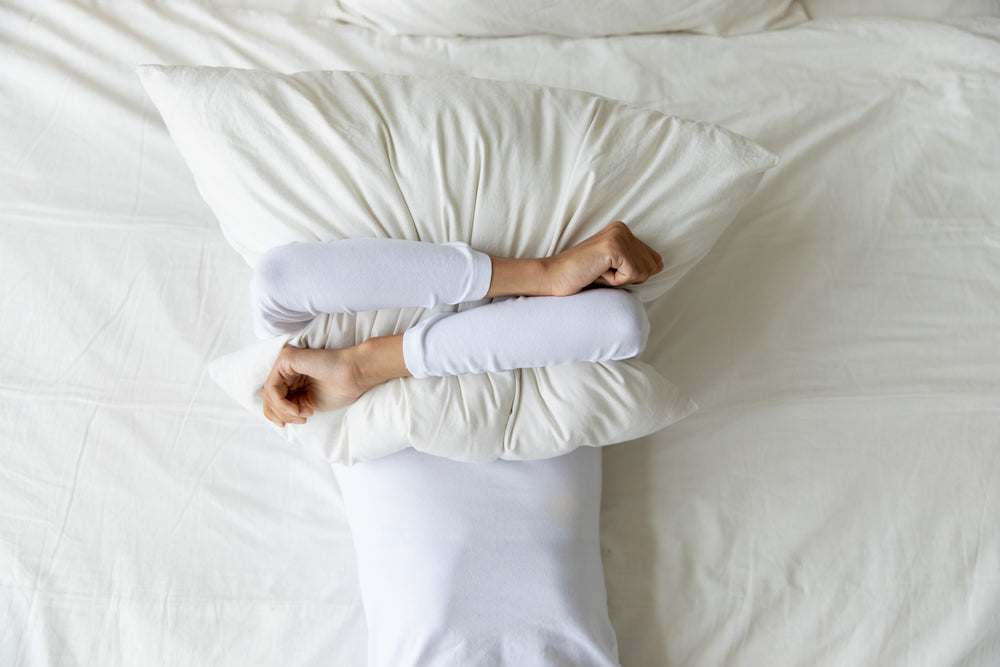Free U.S. Shipping On Orders Over $150

Sleep Anxiety: Signs, Causes and Remedies
Posted on
Most of us look forward to hitting the sack at the end of the day. But there are people for whom bedtime is a dreaded moment. The closer it gets, the more anxious they get about going to sleep.
Sleep anxiety refers to worries and fears about sleep. You may be worried that you will not fall asleep quickly enough, and thus wake up feeling tired or that you will not sleep well at night.
We all get some anxiety about sleep now and then — I always get anxious about getting enough sleep before a big trip the next day. But in some cases, sleep anxiety can get serious and regular enough to disrupt your sleep.
The Problem With Sleep Anxiety
Sleep is a weird thing in that the more you worry about it, the worse it gets. And the worse your sleep gets, the more likely you are to be even more anxious about it. It’s one of those things you definitely don't want to overthink and get anxious about.
Sleep anxiety makes it harder to go to sleep and affects the quality of sleep you get. It can lead to chronic insomnia and sleep deprivation.
And with the lack of sleep, all other areas of your life including your work, focus, emotions and even your health are all going to suffer.
So this is one problem you want to deal with as quickly as possible before it gets out of control. Whenever you start feeling even a bit anxious about sleep, figure out what’s causing it and what you can do about it.
We have dedicated sections below on what causes sleep anxiety and how to deal with it, whether it’s mild or chronic.
What Are The Signs of Sleep Anxiety?
Here are some of the signs and symptoms of sleep anxiety to look out for.
- Worry whether you will be able to fall asleep quickly. This anxiety might extend to the things you need to accomplish tomorrow and whether you will be rested enough to do them.
- Increasing feelings of anxiety around bedtime. You may constantly check the clock and dread the moment you have to go to bed.
- Some people are not anxious about their ability to sleep but rather what will happen when they sleep. This is common for people who have nightmares, sleep apnea, restless leg syndrome and other sleep disorders.
- You get restless around bedtime, and you may even become irritable and moody.
- Sleep anxiety can sometimes manifest as physical symptoms like rapid breathing, sweating, muscle tension and rapid heart rate.
- You are constantly worried about whether you are getting enough sleep and how that’s affecting you. This constant anxiety can affect you even during the day.
What Causes Sleep Anxiety?
People with an anxiety disorder are more likely to also be anxious about sleep. Sleep anxiety can also come from performance anxiety, a type of anxiety we get when we worry we won’t be able to do something. This is common during sex, especially for men.
If you are concerned you won’t be able to sleep, that can easily turn into sleep anxiety and make your fears come true.
If you already have a sleep disorder, you are at a high risk of getting sleep anxiety. People with insomnia often worry that they will not be able to sleep.
An unfriendly sleep environment with lots of distractions like noise and light can also make you anxious about sleep.
Another cause of sleep anxiety to watch out for is sleep trackers. While they are marketed as a way to improve your sleep quality, these gadgets can easily lead to sleep anxiety. As I explained in this post, sleep tracking is not worth it for most people.
How to Deal With Sleep Anxiety
There are two ways to deal with sleep anxiety: by making lifestyle changes and using home remedies, or via medical intervention.
Lifestyle Changes & Natural Remedies
Most cases of sleep anxiety can be resolved by making a few lifestyle changes. For instance, having a regular bedtime routine goes a long way in calming your anxiety and making it easier to sleep.
Include relaxing activities in your routine like a warm bath, reading or breathing exercises. When you go to bed at the same time everyday, you’ll find that you are less anxious about sleep.
As bedtime approaches, avoid anything that might worsen your anxiety like coffee, alcohol, and screens.
It’s also important to remember that it’s normal to take some time before you fall asleep. Normal sleep latency (how long it takes to snooze off) is 10-20 minutes. If you find that you are taking longer than that to sleep, here is a post with tips on what to do when you can’t sleep.
Natural sleep aids like herbal tea (caffeine-free), magnesium and melatonin can also help you deal with sleep anxiety.
Medical Treatment
Some cases of sleep anxiety require medical intervention. This is usually the case if there is an underlying condition that needs treatment such as sleep apnea, chronic anxiety, nightmare disorder or a health problem.
Talk to your doctor for advice.
Quick links
Contact
6063 Hudson Road #160
Woodbury, MN 55125
Yo@hercLeon.com
Leave a comment: